What I Learned About Seed
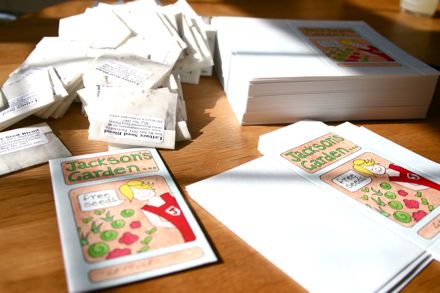
I’m just packing up the first of my books and I’m busy putting together my seed packets to put inside each box. This entails a lot of cutting, sticking, filling and pressing. It’s all a bit Blue Peter and I love it! The seeds I’m using are a Lettuce mix kindly packaged by Victoriana Nursery.
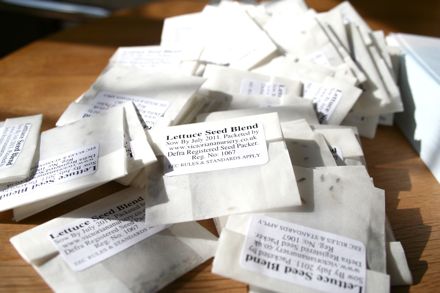
It seems like the most simple and obvious thing in the world; to put some free seeds in with a children’s book about growing vegetables. But actually it has been one of the more complicated areas of producing Jackson’s Garden. I thought you might like to know what I learned.
Firstly, you can’t just package up seed willy-nilly and sent it all over the world. This much I had already guessed but I didn’t know how tight the guidelines were. You cannot send seed outside the EU, fullstop. Inside, the EU you must be a registered seed packer with Defra in order to distribute seeds. Each packer ensures that his or her seeds comply with EEC rules on seed quality.
So…this all means that me, little ole me with my tiny plot, is not really Defra’s idea of a bona-fide seed packer. But so long as I know someone who is (enter Victoriana Nursery) then I can send the children some seed – hooray! So it all worked out in the end.
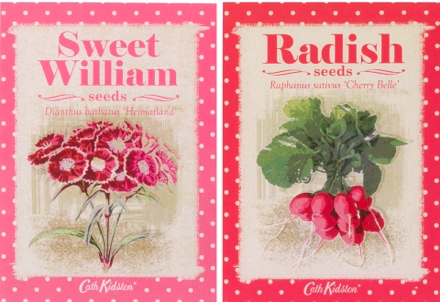
Since discovering all this I have been noticing other non-seed distributors and how they do it. Example, Cath Kidston’s new range of seeds is packed by Thompson and Morgan.
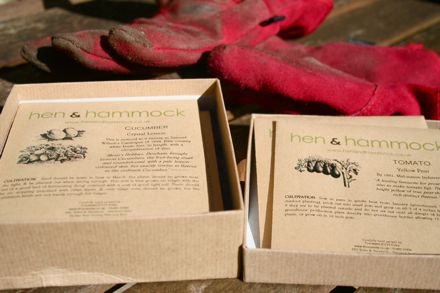
And this gorgeous little box of Culinary Quirks seed by Hen & Hammock, uses seed provided by heritage seed supplier Thomas Etty esq.
Interesting huh? How does this all work in America, or Canada or elsewhere. I’d be interested to know.
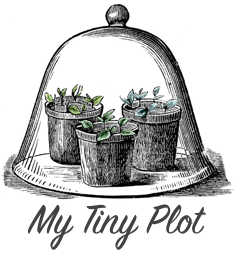 My Tiny Plot
My Tiny Plot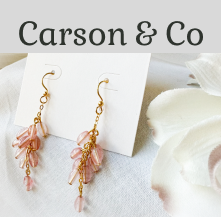



In the U.S. it is on a state by state basis. Each state generally requires a similar seed handlers license. Certain states ban certain plants also for disease and/or invasive reasons.
Sounds complicated, great idea though and sure it will be worth the effort.
tough area, the trading of seeds. But it does make sense because ithese tight controls and guidelines are probably the only way we can keep things like GM modified stuff out of European gardens :-(
I think it is a good thing though, if you think about how the ignorant introduction of non-native (especially none continental) species has caused havoc to some of the biotopes they were introduced to…
great book idea and wonderful to have seedpacks with the books though.
xx
Oh I just love your blog and your book with the seeds is so nice. It’s nice to see someone put so much care and thought into a book — so many others do not.
Whereever I am when the email comes in from My Tiny Plot – I crouch down and read it — I enjoy your writing.
Colleen
I’m sure the children who receive your book will appreciate the effort you have gone to, ensuring that seed can be sent with it.
The Real Seed company get over the legislation by making you a member of their seed club, charging a penny when you order seed.
While the legislation may control the ingress of GM seeds, it also makes it unprofitable for all but the big producers to sell seed. Because of this, we are losing a wealth of old varieties which are no longer profitable compared to modern F1 Hybrids.
Many of these seeds, handed down from generation to generation, are especially suited to do well in the local area and conditions. Living up in far NW Sutherland, we know about conditions!!
I listened to a podcast on BBC Food Programme about seeds and this leglislation has caused the demise of many varieties of plant due to the cost of registration each year for seed producers. Again, big business wins at the cost of small producers. There used to be over 40 varieties of cauliflower for instance which has now dwindled to less than 10 I believe. The seed library is doing its best to help preserve these varients. http://www.gardenorganic.org.uk/hsl/
Nice blog post as always.
Oh! thanks for enlightening us, and here I wsa thinking you could have harvested you home grown seed for sending out.
The comment left by Pete T was also quite informative, thanks for sharing.
I hope this is not crossing the line but how does that affect your overall costs? I am not looking for specifics, I’m just trying to figure out if these rules also hit small busniess ideas like what you are doing hard in the pocket which could cause your overall price to be so high that your product goes out of the range of the customer you maybe aiming to sell to or would you say the cost was relitively negligable?
I’m not entirely certain of the rules around selling, but trading seeds doesn’t appear to be tightly regulated in Canada. Even seed swaps between the US and Canada don’t seem to be all that closely monitored, at least if they’re not a large quantity of seed.
I’ve ordered seeds from “Seeds from Italy”, which is a US company that imports Italian seeds (seems like mostly a brand called Franchi), and didn’t run into any issues. Maybe since they’re part of our continent (we own more of it :P ), they let it slide *LOL*
is there really a difference between trading and selling in legislation ? As an amateur collector of heirloom tomatovarieties I have done seedswaps all over the world from Belgium (EU). I guess some countries (like Australië) would kind of “nuke” the envelopes and probably render the seeds lifeless but until now I have sent and received seeds from Amerika, Japan, UK, … without any problems with the law nor growing them to healthy plants.
I hope there are no GM frauds within the tomato-community, that makes me wonder about the corn seeds I just received however. What a silly world we live in these days ;-)